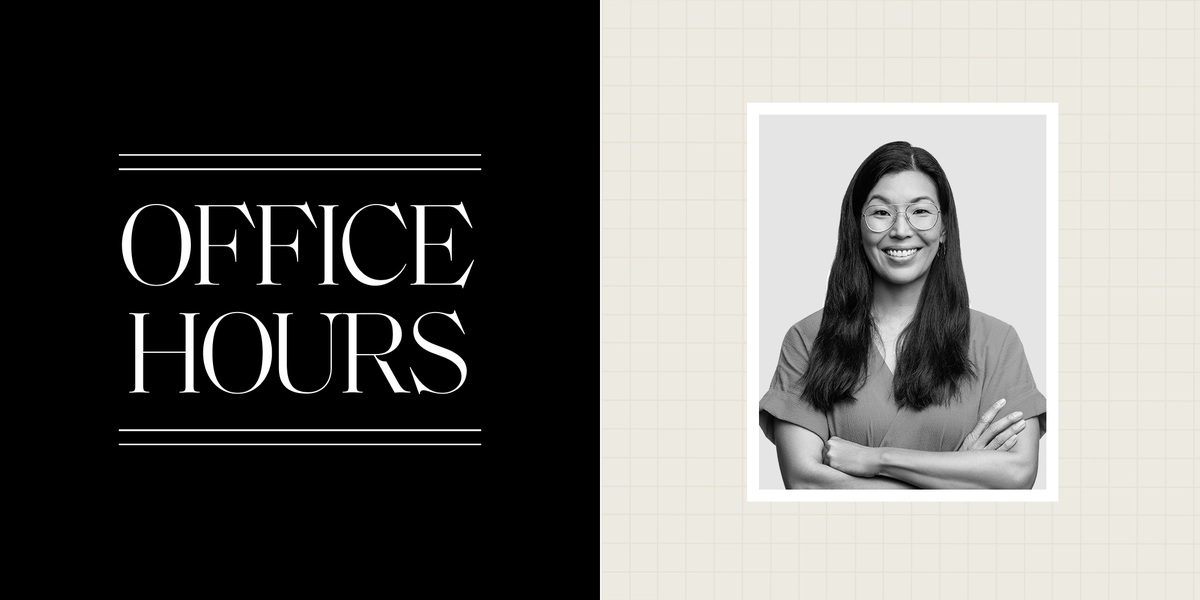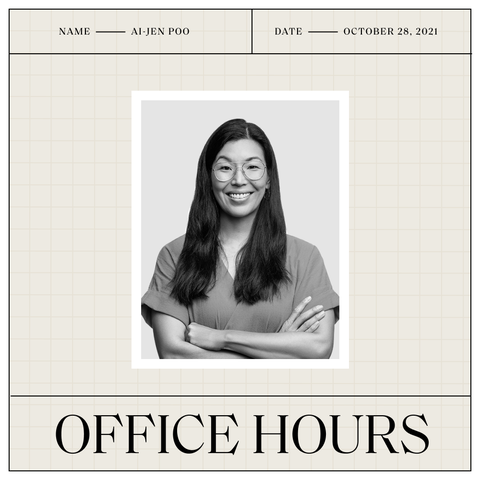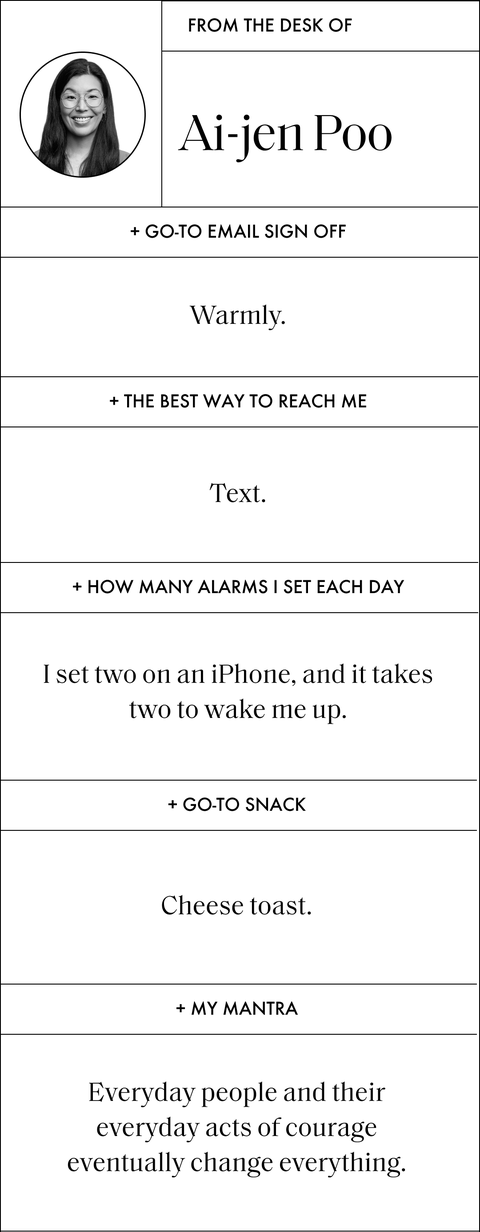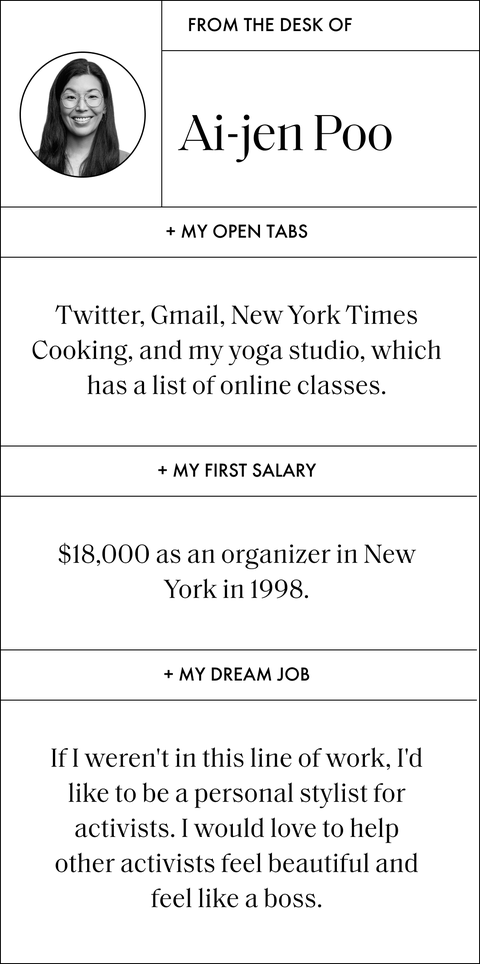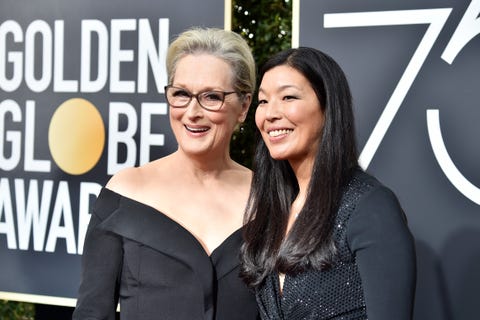Products You May Like
In ELLE.com’s monthly series Office Hours, we ask people in powerful positions to take us through their first jobs, worst jobs, and everything in between. This month, we spoke with Ai-jen Poo, the award-winning activist and labor organizer who’s spent her career advocating for some of the nation’s most essential workers. Poo is currently the executive director of the National Domestic Workers Alliance, a non-profit organization that fights to ensure fair work for those clean and provide care in our homes, a majority of whom are women of color and immigrants. She’s also the director of Caring Across Generations, a coalition working to transform our country’s care system, and her tireless work has to led to a MacArthur “Genius” Grant and a spot on TIME’s 100 Most Influential People list. “There’s a tremendous amount of dedication and a calling to so many to care and provide that care no matter what,” Poo told ELLE.com. “That is a constant source of inspiration to me.” Below, she shares her unique approach to organizing, the best leadership advice she’s received, and her own experience dealing with power imbalances in the workplace.
My first job
I sold running shoes in a little athletic store when I was about 16. I learned that people have all kinds of really specific concerns. Everybody has very, very particular needs, and it’s really important to pay attention and listen to what those are.
What my childhood taught me about the value of women’s work
I come from a long line of caregivers. My grandmother was a nurse, and my mom became a doctor. Not only did they care for people in their professions, but they also cared for so many of us in our family, and a lot of the work they did was taken for granted and not really seen or recognized. I think it led me to really pay attention to how much work women do that just isn’t accounted for, isn’t valued, especially when it comes to caregiving. The opportunity to support women who do caregiving as a profession and have to live off of poverty wages, while also struggling to take care of their families and the people that they love, seems like a really important leverage point to address all the ways in which women’s work is devalued and made invisible.
When I faced harassment in the workplace
I’ve had experiences in the restaurant industry, for example, where sexual and racial harassment were the norm. I remember working the graveyard shift and having people come in the restaurant and harass me and the other waitstaff, talking about how I look like the geisha that was in their dream last night. I’ve also worked in jobs where my boss sexually harassed me. I’ve always had an awareness that, at the time especially, our workplace cultures are not designed to support the dignity of work for women. Women were overwhelmingly concentrated in positions of vulnerability in the restaurant industry. We’re relying on tips to make an income, so we’re at the mercy of customers who come in and think they can do whatever. In a lot of workplaces, men are supervisors, and that power imbalance is one of the reasons why sexual harassment is so prevalent. I feel like every job could be a really good job for women, but we have to make sure that our workplace cultures really support that.
This content is imported from YouTube. You may be able to find the same content in another format, or you may be able to find more information, at their web site.
Why I think love is essential to organizing
I really believe when it comes to fighting for basic human dignity and humanity that there’s no such thing as an unlikely ally. At the end of the day, all of us are powered by the desire to make life better for the people that we love. When I see what caregivers do to take care of the people that they love, and immigrant women who go through tremendous stressors and trauma and travel across borders just to be able to offer a better set of choices for their children and for future generations, it’s a reminder of the power of love. If we can harness that to change the world and the systems and policies that shape our lives, there’s no limit to what we can achieve.
Why I prioritize sleep in my routine
I was told once that sleep is when you’re able to capture your experiences into memory. I think it’s really important that we remember everything that we’ve been through, everything that we’ve survived, everything that we’ve learned, and sleep is really key to being able to remember those things. So I believe in sleep for sure.
The best career advice I’ve been given
Problems are inevitable in anything that you do. And there are two kinds of problems: problems of growth and problems of decay. You generally want problems of growth, so if you’re struggling with those, you’re probably in a good place.
Also, your weaknesses as a leader are never going to become your strengths, but you can do things to minimize your weaknesses and you can enhance your strengths. Something I want to work on is leaning into conflict in ways that are healthy and constructive. I don’t mean conflict with people who hate immigrants, but conflict with people in my family, in my organization, or in the movement. Conflict with people I really love and care about, and figuring out how to engage in constructive ways when there are disagreements that feel hard.
How I cope with (unavoidable) failures
Failures are a constant because so much of what I do, and what the organizations that I’m part of are trying to do is stuff that’s never been done before. The way I move through it is in community, being a part of circles of people who can take the learnings and build from there. You want to create the context where others don’t have to make the same errors. You can make new ones, because that is how we’re going to learn and grow, but you do what you can in community to try to ensure that others don’t have to make the same errors to learn the same lessons.
How I stay grounded when people belittle this work
I remember all the ways women have come together to organize. There’s a long history of domestic workers, especially Black women, in our country who have come together and, through their collective dreams and action, have made the impossible possible. From 1881, when washerwomen in Atlanta went on strike for better pay and were successful in raising wages, to Dorothy Bolden and the founders of the National Domestic Workers Union, who organized domestic workers throughout the South, not just to improve their conditions but to also vote and be a part of our democracy. We are part of a proud tradition of women of color who have come together and expanded the realm of what’s possible. That’s what we do. Even if our ideas are dismissed as impossible, or even if we’re not seen as visionaries and strategists, that is what we are. No one can take that away from us.
This interview has been edited and condensed for clarity.
This content is created and maintained by a third party, and imported onto this page to help users provide their email addresses. You may be able to find more information about this and similar content at piano.io
